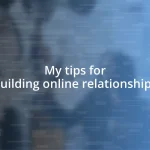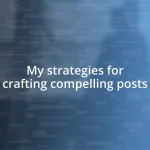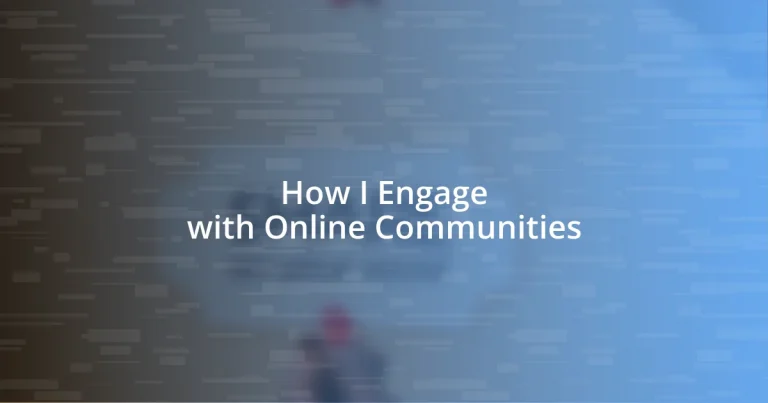Key takeaways:
- Emotional resonance and genuine interactions are crucial for fostering meaningful engagement in online communities.
- Identifying the right communities based on shared interests and values enhances participation and builds lasting connections.
- Consistent contributions and leveraging feedback for personal growth can transform experiences and strengthen relationships within the community.
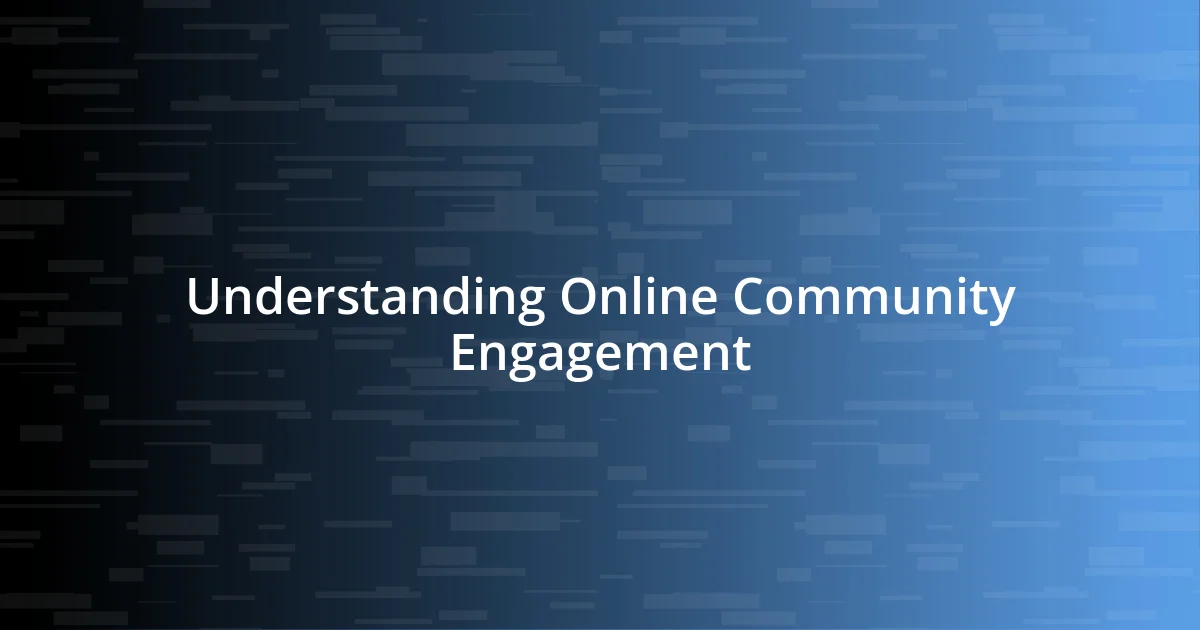
Understanding Online Community Engagement
Engaging with online communities goes beyond simple participation; it’s about creating meaningful connections. I remember the first time I joined a forum dedicated to a passion of mine. The thrill of sharing my thoughts and receiving immediate feedback made me realize the power of community. It’s incredible how a few kind words from strangers can uplift your day and motivate you to contribute more.
When I think about engagement, I often wonder, what makes someone feel valued in a virtual space? For me, it often comes down to genuine interactions. I once posted a personal story in a group, and the heartfelt responses I received weren’t just about the likes; they were about people connecting with my experience. That moment reinforced my belief that emotional resonance is key in fostering engagement.
Another aspect that stands out is the role of shared interests in driving participation. I frequently engage in discussions about books I’ve read and the insights I’ve gained. The energy I feel from connecting with others who share my passion is unmatched. I often ask myself, how can I contribute positively in return? By sharing my perspectives and actively listening to others, I’ve discovered that community engagement can be both fulfilling and transformative.
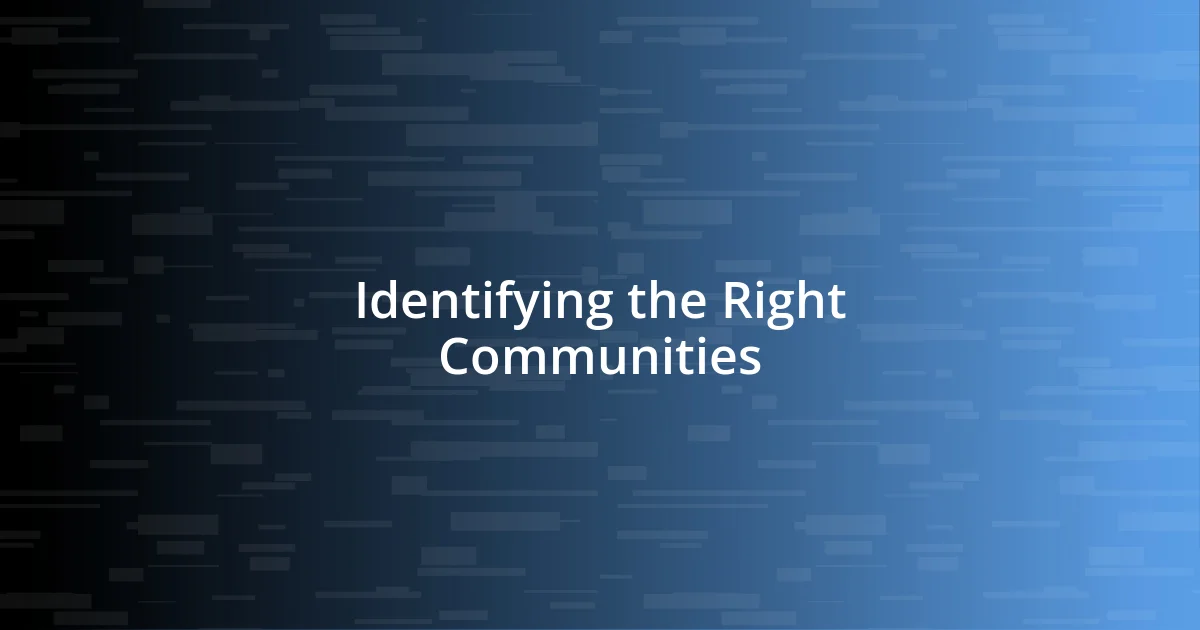
Identifying the Right Communities
Identifying the right online communities is crucial for enhancing your engagement experience. I once found a small niche group focused on vintage photography, and it felt like discovering a hidden treasure. The depth of conversation and the passionate members helped me not only learn but also share my own journey in this art form. It reminded me that it’s often the smaller, specialized communities that foster genuine connections and in-depth discussions.
As I navigated the vast array of platforms, I learned to look for communities with active moderation and a welcoming atmosphere. One time, I stumbled upon a tech forum that was incredibly well-moderated. The conversations were respectful, and everyone’s opinions mattered. This really stood out to me because a positive environment can make all the difference in how comfortable you feel sharing your own thoughts.
Analyzing the common themes and values within a community is an insightful way to assess its fit for you. For instance, I joined a movement for sustainable living and was struck by how aligned our values were. This made it easier to engage because I felt understood and accepted. Finding communities where your values resonate can not only enhance your participation but also lead to lasting friendships.
| Community Type | Characteristics |
|---|---|
| Niche Groups | Deep conversations, passionate members |
| Well-Moderated Forums | Respectful interactions, safe space |
| Value-Aligned Communities | Shared beliefs, long-lasting connections |
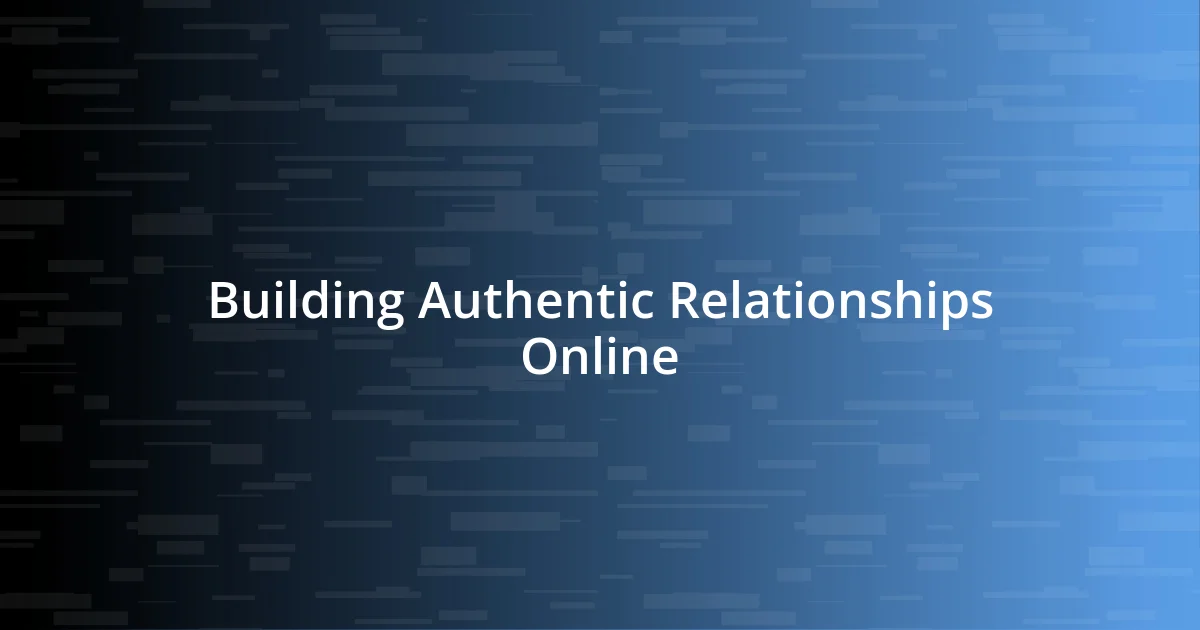
Building Authentic Relationships Online
Building authentic relationships in online communities requires intention and genuine effort. I remember joining a creative writing group where I initially felt hesitant to share my work. However, when others opened up about their struggles and triumphs, it encouraged me to do the same. This vulnerability created a ripple effect, forging connections that felt real and profound, despite being on the other side of a screen. It’s amazing how sharing your journey can encourage a similar reaction from others, creating a tapestry of support and friendship.
To cultivate these authentic relationships, I focus on several key practices:
- Share personal experiences: Being open about my own journey allows others to relate and engage on a deeper level.
- Acknowledge contributions: Simple acknowledgment of others’ posts can make someone feel seen and appreciated, fostering a sense of belonging.
- Engage in meaningful conversations: Instead of surface-level interactions, I ask thoughtful questions that encourage dialogue and connection.
- Participate regularly: Consistency helps build trust. The more I show up, the more others recognize me as a reliable community member.
- Practice active listening: Taking the time to genuinely understand others’ perspectives strengthens relationships and builds rapport.
By being intentional in these ways, I’ve seen firsthand how authentic connections can transform a virtual community into a supportive network. It’s all about creating a space where everyone feels valued and connected.
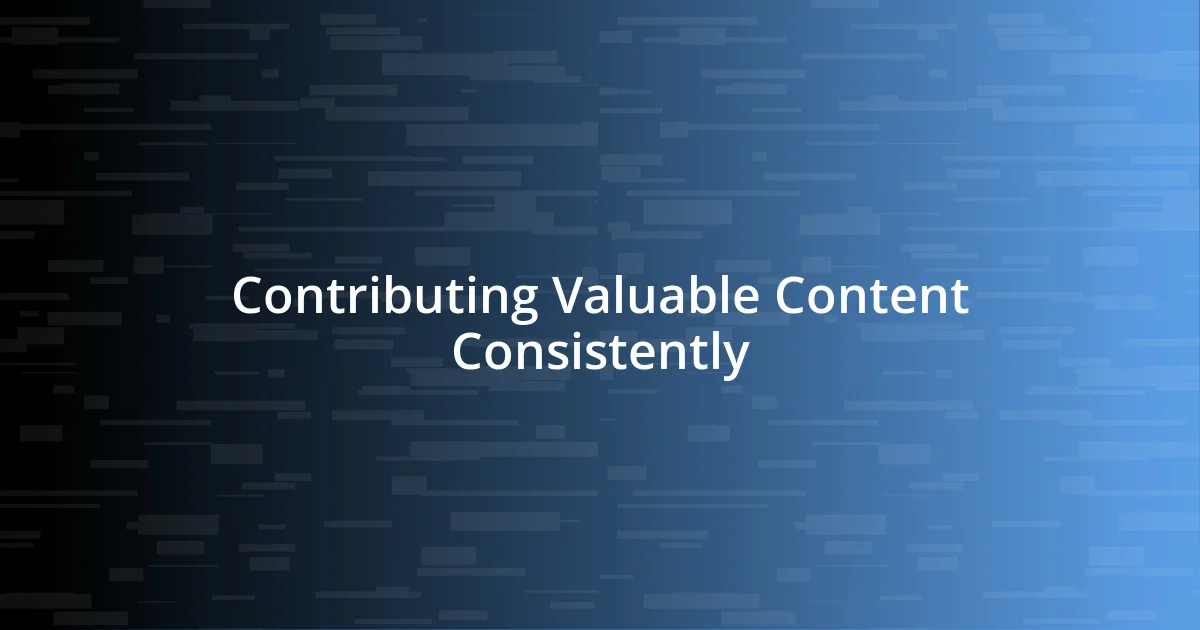
Contributing Valuable Content Consistently
Contributing valuable content consistently is all about being present and engaged. I recall a time when I dedicated a few hours each week to share insights on a parenting forum. It wasn’t just about offering tips; it was about weaving in personal stories—like how my toddler once turned a simple grocery trip into an impromptu dance party. Those moments resonated with others, sparking conversations that brought the community closer together.
It’s fascinating to see how regular contributions can build your reputation within a community. I remember one member who tirelessly shared resources about mental health. Every time they posted, I felt a surge of gratitude. It was a reminder of how one person’s consistent effort can illuminate paths for others and enrich the collective experience. Have you ever considered how your experiences might be the light someone else needs in their journey?
Consistency also fuels your growth as a contributor. I’ve taken note of how my reflections evolve when I post regularly. Initially, my comments were brief, but as I became part of the daily chatter, my insights grew deeper and richer. Engaging with others not only enhances my own understanding but also creates an environment where knowledge flows freely. When I see someone echo my thoughts or even challenge them, it ignites a curiosity within me, encouraging further exploration.
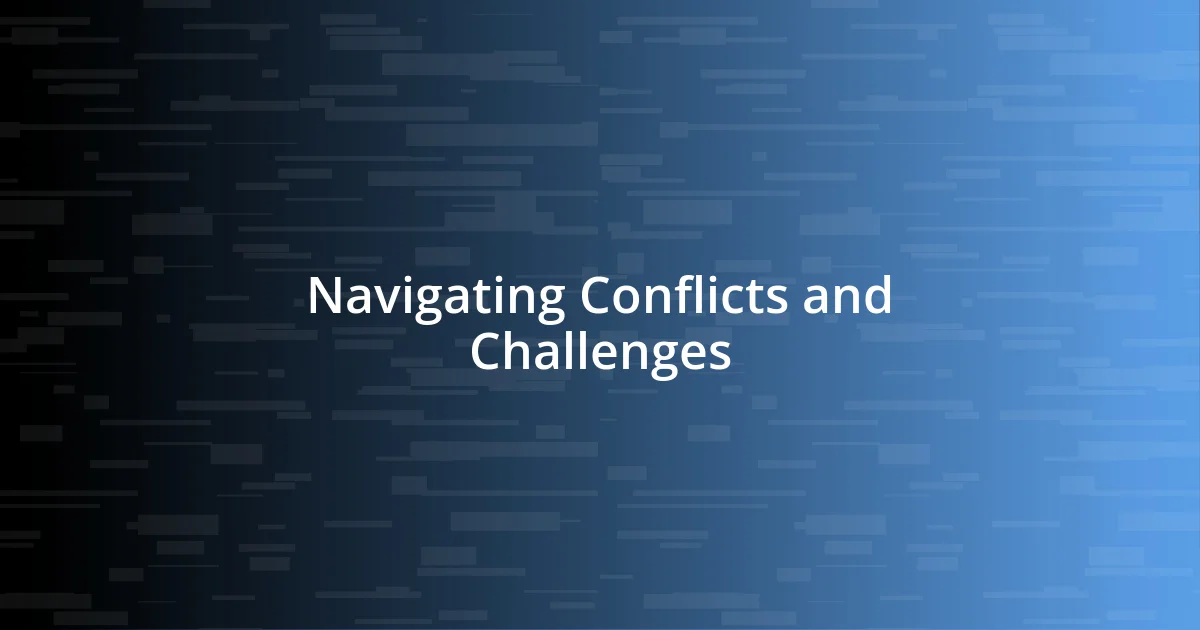
Navigating Conflicts and Challenges
Navigating conflicts in online communities can be a delicate dance. I once participated in a discussion about a controversial topic, and emotions ran high. Instead of jumping in with my opinion right away, I took a step back to understand different viewpoints. I remember how calming it was to acknowledge the tension and invite others to share their feelings. This simple act helped transform a heated exchange into a constructive dialogue, reminding me that we all have something valuable to say.
Challenges like misunderstandings often arise when tone and intent can get lost in text. In a lively forum, I misinterpreted someone’s sarcastic comment, leading to a miscommunication that could have snowballed. Fortunately, I chose to address it directly, asking for clarification rather than letting resentment brew. Why do we sometimes assume the worst in others? That experience taught me the importance of clear communication—I’ve learned that taking the time to clarify not only resolves conflicts but also strengthens relationships.
I also find that setting boundaries can be crucial in maintaining a positive community experience. There’s a fine line between engaging in spirited debates and becoming overly invested in negativity. After a particularly draining argument on a film critique page, I decided to limit my exposure to toxic discussions. I realized that protecting my mental space shouldn’t be a burden but an act of self-care. Have you ever considered how stepping back can refresh your perspective and help you engage more positively? By navigating challenges with intention, I’ve discovered that I can foster a healthier atmosphere for both myself and others.
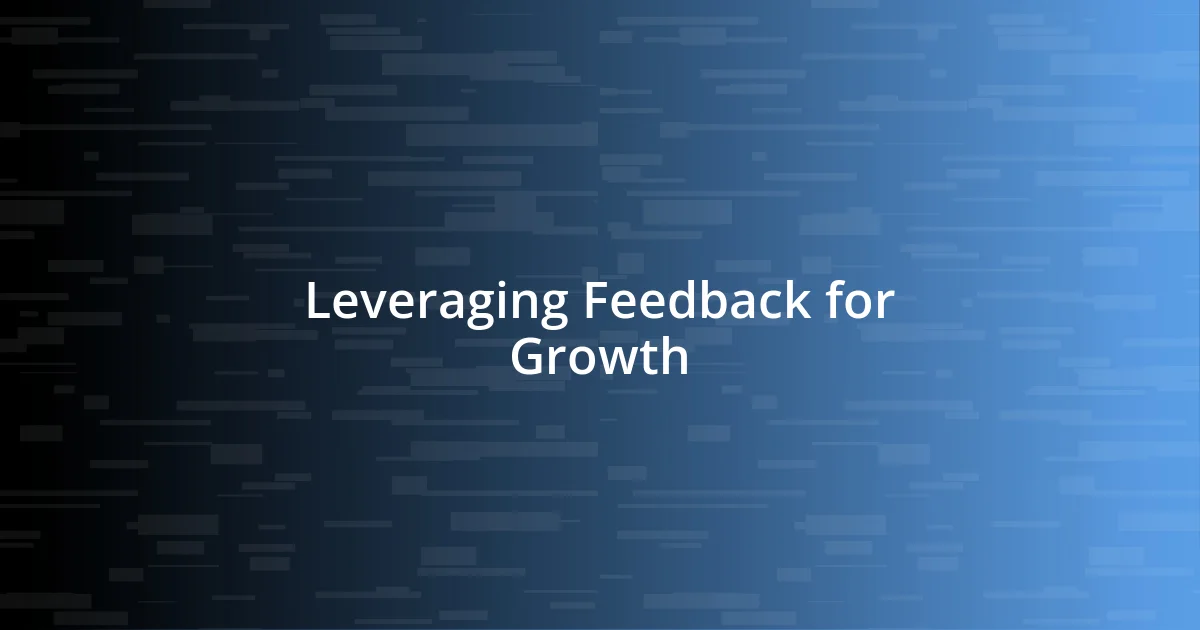
Leveraging Feedback for Growth
Leveraging feedback for growth is one of the most rewarding aspects of participating in online communities. I recall a time when I shared a recipe in a cooking forum, and received a mix of suggestions and positive comments. One member even pointed out a spice I’d overlooked, which transformed my dish! This interaction not only improved my cooking skills, but it also made me realize that each piece of feedback is an opportunity for personal growth. Have you ever thought about how a simple suggestion could open up new avenues for your learning?
Sometimes, feedback isn’t as straightforward, and that’s where things get interesting. I uploaded a piece of writing to a literature group, and the critique I received was more challenging than I’d anticipated. While I felt a little defensive at first, I took a step back to appreciate the insights shared. One comment about my character development hit home; it encouraged me to rethink my writing approach entirely and pushed me to explore my writing voice in more depth. Have you found that the toughest critiques often lead to your biggest breakthroughs?
Engagement doesn’t stop with just receiving feedback; it extends to responding thoughtfully. After integrating suggestions into my work, I’ve made it a point to circle back to those who contributed. When I thanked them for their insights, it opened the door for more meaningful conversations. I remember how one person’s initial feedback sparked a collaborative project that evolved into what became one of my favorite creative endeavors. How often do you reach out to those who have helped you grow? This reciprocal relationship can truly amplify the sense of community and shared learning.

Measuring Engagement Success Metrics
Measuring engagement success metrics in online communities requires a multifaceted approach. I remember tracking my participation in a photography group where we began using simple metrics like likes and comments. Initially, I focused on the number of likes I received on my photos, thinking it indicated popularity. However, I soon realized that the most valuable metric was actually the depth of the comments—insightful critiques often led to better photography, while a simple “great shot!” didn’t offer much for growth. Have you considered how qualitative feedback can sometimes outweigh quantitative numbers?
One thing I’ve learned over time is the importance of observing member retention rates. In a health and wellness forum I frequent, we started a monthly challenge that kept members engaged and returning. Tracking participation in these events revealed that consistent challenges dramatically increased our retention rate. It made me wonder—how often do community leaders analyze what keeps their members coming back? Those monthly challenges not only strengthened ties but also helped create a sense of accountability, reinforcing my commitment to personal goals.
Lastly, I’ll never forget a time when we implemented surveys to gather insights straight from members about their experiences. I remember crafting questions that went beyond surface-level metrics to understand what truly resonated with our community. The feedback highlighted areas for improvement that we hadn’t even considered! This initiative transformed our group dynamic, making everyone feel heard. Have you thought about how asking the right questions can unlock deeper levels of engagement? By integrating these success metrics, I felt immersed in a truly collaborative environment, where everyone’s voice mattered.






